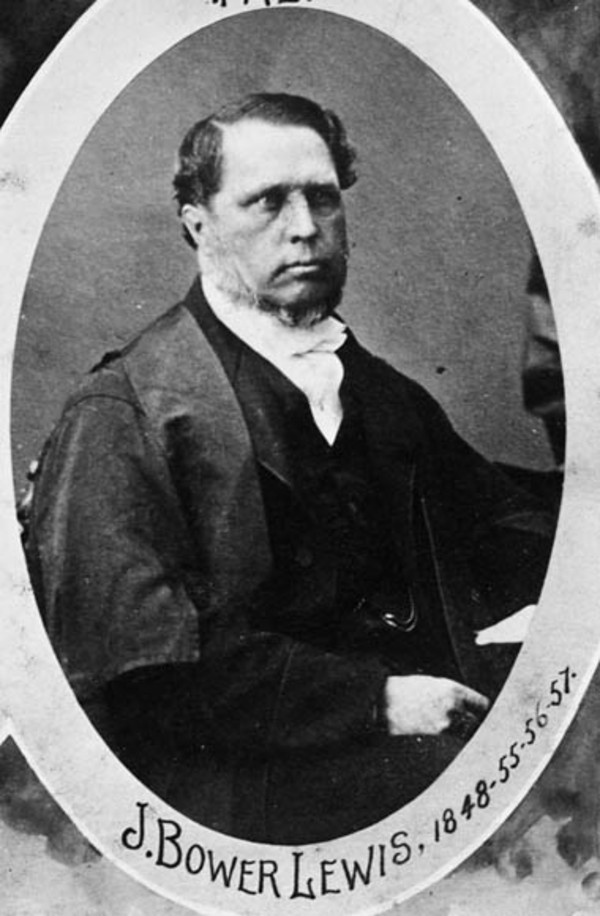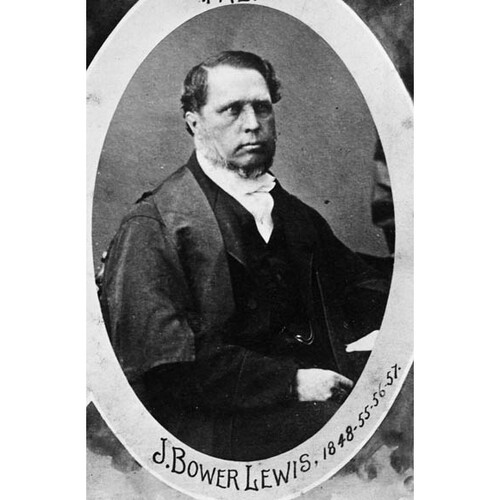LEWIS, JOHN BOWER, lawyer, politician, and land speculator; b. in France, 18 March 1817, son of Captain J. B. Lewis of the 88th Light Infantry; he was married three times, to Anna Eccles in 1840, to Helen Street in 1843, and to Elizabeth Susan Wilson in 1856, and had 11 children; d. in Ottawa, Ont., 24 Jan. 1874.
John Bower Lewis came to Canada with his parents and they settled near Bytown (Ottawa) in 1820. He studied law in Toronto with James Boulton, was admitted to the bar in 1839, and became a qc in 1867 and a bencher in the Law Society of Upper Canada in 1871. He practised law in Bytown and also bought and sold land in the area.
Lewis entered politics in 1847 when he was elected to the council of the district of Dalhousie (corresponding to the present county of Carleton) and to the first municipal council for Bytown. He contested the seat of Carleton unsuccessfully in the 1847–48 election for the Legislative Assembly but was later chosen as Bytown’s second mayor, for 1848–49. Bytown became the city of Ottawa in 1854 and Lewis was chosen its first mayor in 1855. He was also appointed police magistrate in 1855 and served as city recorder from 1855 to 1869. He was appointed police commissioner in 1863 and was the city solicitor when he died.
John Lewis was normally a Conservative but placed community above party interests. Thus he braved Sir John A. Macdonald*’s wrath and supported the entry of Richard William Scott*, a powerful Ottawa Catholic, into Edward Blake*’s provincial Liberal government of 1871. In 1872 Lewis and Joseph Merrill Currier* both entered parliament following election by acclamation for the two-member seat of Ottawa. In 1873 he was considered a possible successor to Sir Francis Hincks*, minister of finance, but he left his party over the Pacific Scandal later in the same year. He indicated firmly, however reluctantly, that he would oppose Macdonald’s government. Lewis either found the government’s actions unacceptable in principle or he wished to protect the interests of the Ottawa valley, for, as Richard Cartwright* pointed out, “the Ottawa country . . . goes with the tide.” In 1874, J. B. Lewis was again nominated for Ottawa, as an “Independent” but with Liberal support. He died during the campaign.
PAC, MG 24, B40 (Brown papers), 8; MG 26, A (Macdonald papers), 194, 301; MG 27, II, D14 (R. W. Scott papers), 3–5. PAM, Alexander Morris papers, Ketcheson collection, Alexander Campbell to Alexander Morris, 29 Nov. 1873. PAO, Edward Blake papers; Cartwright family papers; Alexander Morris papers. Globe (Toronto), 1874. Ottawa Citizen, 1855–74. Packet (Bytown), 1847–49. PANS, Report, 1952, app.B. Can. biog. dict., I. Can. parl. comp., 1873; 1875. A. H. D. Ross, Ottawa, past and present (Toronto, 1927). Swainson, “Personnel of politics.”
Cite This Article
Donald Swainson, “LEWIS, JOHN BOWER,” in Dictionary of Canadian Biography, vol. 10, University of Toronto/Université Laval, 2003–, accessed April 25, 2025, https://www.biographi.ca/en/bio/lewis_john_bower_10E.html.
The citation above shows the format for footnotes and endnotes according to the Chicago manual of style (16th edition). Information to be used in other citation formats:
| Permalink: | https://www.biographi.ca/en/bio/lewis_john_bower_10E.html |
| Author of Article: | Donald Swainson |
| Title of Article: | LEWIS, JOHN BOWER |
| Publication Name: | Dictionary of Canadian Biography, vol. 10 |
| Publisher: | University of Toronto/Université Laval |
| Year of revision: | 1972 |
| Access Date: | April 25, 2025 |




